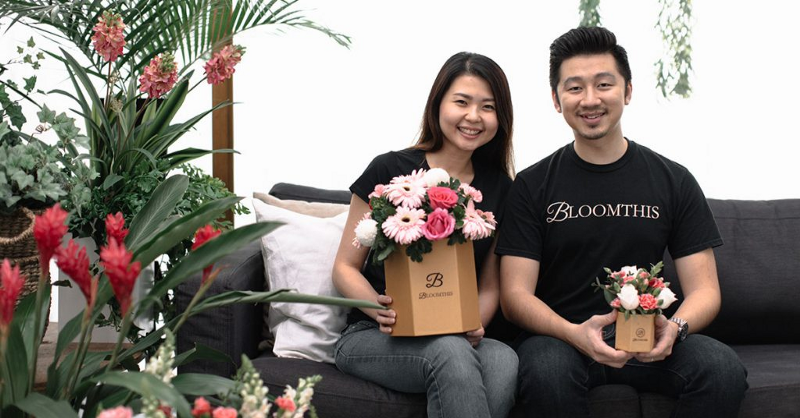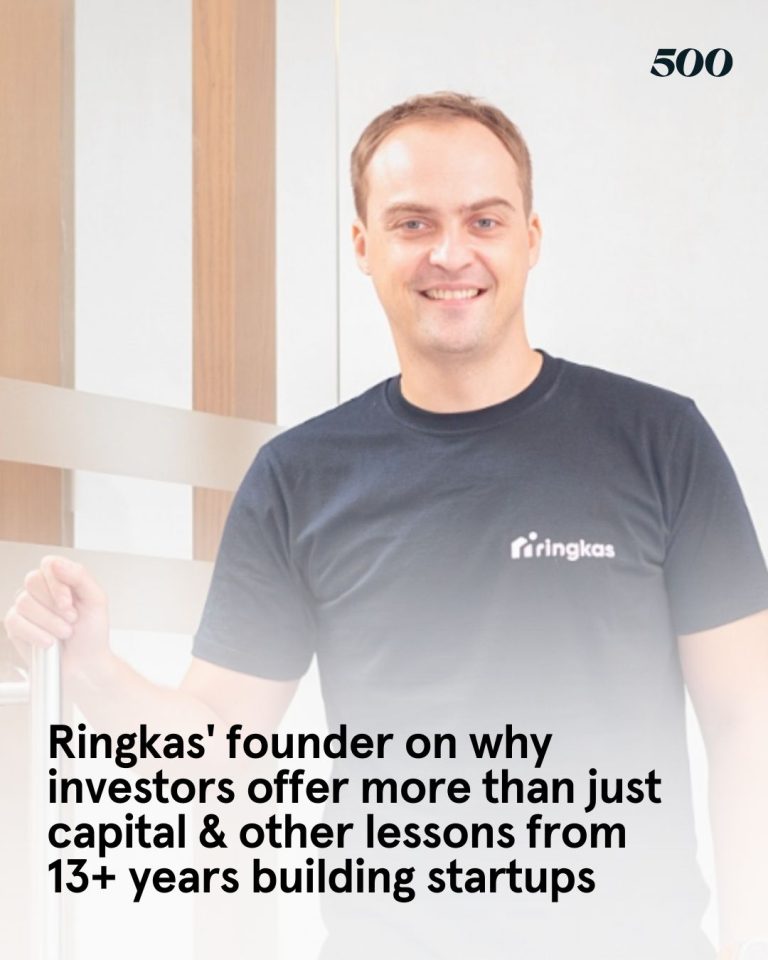In times of bloom
- In her recent opinion piece, Sheryl Sandberg, chief operating officer of Facebook and founder of LeanIn.org, gave a shout out to 500-backed Malaysian e-commerce startup BloomThis.
- She detailed the journey the company’s co-founder and CEO, Giden Lim undertook, from spending time at his mother’s florist shop to building an ecommerce business with co-founder and then-fiance, Penny Choo.

- When the Covid-19 pandemic came, BloomThis was hit on both ends of the business — demand for flowers fell as weddings and events were canceled, and lockdown restrictions held up their ability to import flowers, drying up supply.
- The result: a 90% drop in revenue
- Amid a global economic downturn, the duo got to work. They launched new products and promoted them through personalized ad campaigns on the same online platforms they used before.
- “We continued to execute the plans that we had around food products like cakes and ice-cream, bundling them with the flowers,” Giden told The Edge Markets.
- To bolster supply, the company looked local, towards flower farms in Cameron Highlands. “We had to tell our customers that we had to substitute flowers in certain products because of the MCO and I have to say, they were all very supportive and understanding.”
- “For many businesses forced to close their doors during lockdowns, or run under restrictions as BloomThis has, Facebook and Instagram have been a lifeline,” Sheryl wrote. “Their stories show just how important e-commerce, powered by data-driven tools, is to recovery efforts in the region and beyond.”
- Leveraging personalized advertising, BloomThis used customer data safely and responsibly to connect with their buyers in meaningful ways even during this difficult time.
- “[This] is the secret ingredient that makes success possible…The pandemic has proved the value of connection, cooperation across borders and the economic opportunity created by an open internet,” she concluded.
- Click here to read Sheryl’s full piece.
“Huge potential” for MSMEs

- 500-backed fintech startup First Circle has renewed its partnership with the Department of Trade and Industry (DTI) in the Philippines.
- What does this mean? More loans for MSMEs within the country amid the economic slowdown. Only 6 percent of total loans in the country are MSME borrowings, according to the Business Mirror.
- Since signing their first partnership in 2018, First Circle has “extended borrowings to 6,000 SMEs and disbursed over 16,000 loans” worth over US$93 million.
- It is also the only fintech company from the Philippines that earned a place on Metlife and Visa’s ‘Inclusive Fintech 50’, a roster of “most promising startups providing credit, insurance, savings, and other critical products to low-income households and businesses that are particularly vulnerable to financial shocks like the coronavirus (COVID-19) economic crisis”.
- First Circle Managing Director Moritz Gastl, sees “huge potential” for the firm to reach the mass MSME market in the country. B2B MSMEs are still operating in “dark ages” according to Gastl. “First Circle’s business model creates a competitive advantage from market deficiencies, delivers unparalleled customer value and reaches the mass market.”
- Get the full press release here.
Doubling down
- “Consumers who have now tried online grocery shopping have doubled”, reads the new e-Conomy SEA 2020 report. And over 75% of those shoppers have indicated they’ll continue with online groceries post-COVID-19.
- Chief Executive Officer (CEO) of 500-backed HappyFresh, Guillem Segarra, sat down with the Indo Tekno podcast to speak to that growth accelerated by the pandemic.

- “…what we’re seeing now in September, October and coming up to November, is that, besides the fact that our top line is probably our peak, our retention rates are better than ever. And what we can deduce from that is that the customers that tried HappyFresh for the first time in March, April and May have now turned into loyal customers, and are fully digital when it comes to shopping for groceries online,” said Segarra.
- According to Guillem, HappyFresh focuses on three main things to turn their one-time users into loyal customers:
- providing a full range of products from the comfort of your home;
- developing a quality fleet of personal shoppers;
- and adding value through promotions and discounts.
- In the spirit of getting others to join the party, HappyFresh also provides a ‘plug-and-play’ solution for brick-and-mortar supermarkets to go digital without them needing to put any upfront capital investment or worry about maintenance of the online system.
- For 2021, Guillem shares that HappyFresh is looking to their supermarket partners to “double down or triple down into their digital channels.”
- “Today, the opportunity in the markets we operate in alone is estimated to be already above US$1 billion of annualized revenues. We believe that that would rise to above US$10 billion by 2025.”
- For its loyal customers, HappyFresh is planning to launch a loyalty program next year, aiming to provide additional benefits. An inter-country expansion in Indonesia is also in the works, with the company eyeing cities outside of Java.
- Listen to the full podcast here.
Missed out the last Daily Markup? Go here to check it out.
You can also find us on LinkedIn, Facebook, Twitter, and Instagram.

500 Startups is a venture capital firm on a mission to discover and back the world’s most talented entrepreneurs, help them create successful companies at scale, and build thriving global ecosystems. In Southeast Asia, 500 Startups invests through the pioneering 500 Southeast Asia family of funds. The 500 Southeast Asia funds have backed over 240 companies across multiple sectors from internet to consumer to deep technology. It continues to connect founders with capital, expertise and powerful regional and global networks to help them succeed.
This post is intended solely for general informational or educational purposes only. 500 Startups Management Company, L.L.C. and its affiliates (collectively “500 Startups”) makes no representation as to the accuracy or information in this post and while reasonable steps have been taken to ensure that the information herein is accurate and up-to-date, no liability can be accepted for any error or omissions. All third party links in this post have not been independently verified by 500 Startups and the inclusion of such links should not be interpreted as an endorsement or confirmation of the content within. Information about portfolio companies’ markets, competitors, performance, and fundraising has been provided by those companies’ founders and has not been independently verified. Under no circumstances should any content in this post be construed as investment, legal, tax or accounting advice by 500 Startups, or an offer to provide any investment advisory service with regard to securities by 500 Startups. No content or information in this post should be construed as an offer to sell or solicitation of interest to purchase any securities advised by 500 Startups. Prospective investors considering an investment into any 500 Startups fund should not consider or construe this content as fund marketing material. The views expressed herein are as at the date of this post and are subject to change without notice. One or more 500 Startups fund may have a financial interest in one or more of the companies discussed.




